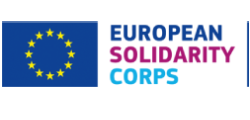Training and support for participants
The European Solidarity Corps provides a range of support services for participants and participating organisations, to ensure learning, insurance and other important elements.
They are designed in compliance with the principles of the European Solidarity Corps.
They also help maintain a high level of quality within the European Solidarity Corps and ensure that activities are validated in the correct manner.
General online training
General online training is an open-access training for all registered candidates and participants, available via the European Solidarity Corps portal. Its modules include:
- the mission of the European Solidarity Corps
- participants’ roles and responsibilities
- inter-cultural awareness
- health and safety
- and many more.
Online language support
Online language support (OLS) is designed to help participants improve their knowledge of the language they’ll be working in. The OLS is hosted on a corporate learning management platform of the European Commission called EU Academy.
The service is available for all official EU languages: Bulgarian, Czech, Danish, German, Greek, English, Estonian, Spanish, Finnish, French, Irish Gaelic, Croatian, Hungarian, Italian, Lithuanian, Latvian, Maltese, Dutch, Polish, Portuguese, Romanian, Slovak, Slovenian and Swedish. The online language learning service is additionally available for Basque, Galician and Catalan.
Once your organisation has selected a participant for a European Solidarity Corps activity, lasting 2 months or more, it should send the participant his or her login for the OLS by email.
Training
The training and evaluation cycle is designed both for participants and participating organisations.
Participants taking part in long-term activities are entitled to the following training sessions:
- pre-departure training (only cross-border activities)
- on-arrival training
- mid-term evaluation (only activities of 6 months or longer)
- annual European Solidarity Corps event.
Participating organisations will benefit from the following training sessions:
- training for organisations having been awarded recently the Quality Label
- an annual event for organisations holding the Quality Label
The training should ensure understanding of organisation’s roles and responsibilities, give practical and technical information on the project management, inform about important features of the Corps, support organisation in developing qualitative projects and provide networking opportunities.
Insurance
Participants in European Solidarity Corps activities must always be in a safe environment.
They are insured for the duration of their activity, from the moment they leave for their host country until the end of the second month after completing their activity.
Participants in cross-border activities (those involving more than one country) have:
- complementary coverage, provided by the European Commission, in addition to the European Health Insurance Card (EHIC) or the host country’s national health system
- primary coverage, provided by the European Commission, if the participant cannot have the EHIC free of charge, or if they are not entitled to coverage under the national regulatory framework.
Any costs incurred by participants in activities organised in their own country will be reimbursed if they are not covered by the national health system.
The host organisation must ensure that the participant has a European Health Insurance Card and if that was not possible, to ensure that the participant is covered by the mandatory insurance plan for which the Corps makes provision.
For more information about coverage and support, plus instructions for taking out insurance, see the website of the insurance company.
Visas & residence permits
Participants may need a visa to spend time abroad in the partner country that is hosting their activity, or to travel on from that country.
Participants are strongly recommend to apply for a visa well in advance, as it may take several weeks for it to be issued.
For further help or advice on matters such as visas, residence permits and social security contact your National Agency and/or the Executive Agency.
The EU immigration portal is a good source of general information on both short-term and long-term visas and residence permits.
Agreements with participants
Before travelling abroad, everyone participating in an individual volunteering activity supported by the European Solidarity Corps must sign a participant agreement. This must define at least the following aspects of the activity:
- Rights and responsibilities with regard to the insurance and the financial contribution provided by the Corps
- Tasks to be performed during the activity
- Intended learning outcomes.
Mentoring
Participants should be given personal support through mentoring in the course of their activity. This can help them to integrate, both into an organisation that is new to them, and, if they are volunteering or working abroad, into a different country.
Youthpass
Youthpass – open to all Corps participants – is a tool that helps participants to identify and document the learning outcomes they developed on the project. It allows them to describe what they have done and show what they have learnt – including skills that are informal or non-formal. This is all set out formally in a Youthpass certificate. So far, over 1 million people have used the scheme and have been awarded the certificate.
Depending on the type of recognition you need, the creation of a Youthpass certificate can also help you to reflect and create your Curriculum Vitae (CV) in Europass.
There is a role for participating organisations in helping participants to reflect on what they have learned and document their learning outcomes with the help of Youthpass or other EU or national validation tools.
Certificate of participation
This certifies participation in European Solidarity Corps activities. On completing the planned activity and the survey on their experience, participants are entitled to a certificate issued through the European Solidarity Corps portal by one of the organisations involved.
Info Kit
Organisations must ensure that the volunteer receives the European Solidarity Corps Info Kit, or Info Kit for Humanitarian aid volunteering which provides essential information about their rights, responsibilities, and practical aspects of their volunteering experience.
It includes details on insurance and support available during their placement
